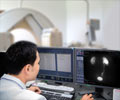- Renal Artery Disease - (http://my.clevelandclinic.org/services/heart/disorders/renal_artery_disease)
- Renal artery stenosis - (http://www.mayoclinic.org/diseases-conditions/renal-artery-stenosis/basics/definition/con-20036702)
What is Renal Artery Stenosis (RAS)?
The term “renal” refers to the kidneys and “stenosis” means narrowing. The renal arteries are blood vessels carrying oxygen-rich blood from the aorta in the heart to the kidneys. Narrowing of the renal arteries prevents adequate supply of blood to the kidneys resulting in renovascular hypertension (high blood pressure) and damage to the renal tissue. This condition may often lead to renal failure.
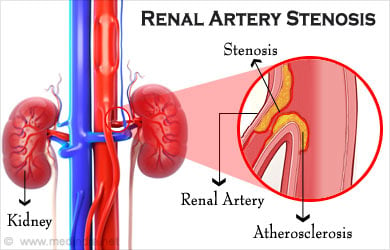
Causes of Renal Artery Stenosis
Atherosclerosis is caused by plaque build-up in the renal arteries. Plaque is comprised of fat and cholesterol and as it builds up it narrows and blocks the renal arteries. More than 80% of all RAS is caused by atherosclerosis. RAS can also be caused by a congenital disorder called fibromuscular dysplasia which causes thickening of the internal portions of the arteries without any atherosclerotic plaque build-up.
Symptoms of Renal Artery Stenosis
As the condition progress, symptoms include high blood pressure, resistance to blood pressure medications, decreased kidney function, congestive heart failure or shrunken kidneys.
RAS generally leads to a decline in kidney function. Some of the symptoms of decreased kidney function include:
- Increase or decrease in urination
- Edema – swelling in the legs especially around the ankles
- Fatigue
- Drowsiness
- Itching
- Dry skin
- Headaches
- Nausea and vomiting
- Weight loss
- Appetite loss
- Muscle cramps
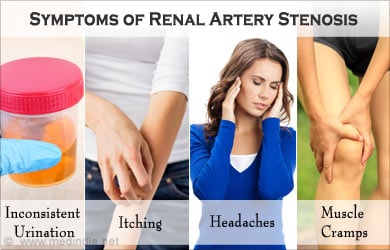
Diagnosis of Renal Artery Stenosis
Auscultation usually provides initial clues about the presence of RAS. When blood flows through a narrow artery it usually makes a “whooshing” sound called a bruit. Doctors usually follow-up with other diagnostic imaging tests like:
- Duplex ultrasound – which combines traditional ultrasound with Doppler ultrasonography. This is a painless, non-invasive technique that does not require anesthesia.
- Catheter angiogram – is a type of x-ray where a thin, flexible tube called catheter is threaded through the large arteries from the groin to the renal artery. A contrast dye is injected through the catheter to view the renal artery clearly. This is a technique requiring a sedative and usually performed as an outpatient.
- Computerized tomographic angiography (CTA) scan – which is a combination of x-rays and computer technology to create high-resolution x-rays. A contrast dye is injected in the patient’s vein to enable a clearer view of the arteries. This is again a non-invasive, outpatient procedure.
- Magnetic resonance angiogram (MRA) – this technique uses radio waves and magnets to create detailed images of internal organs. Again a contrast dye may be used. This is also a non-invasive, outpatient procedure.
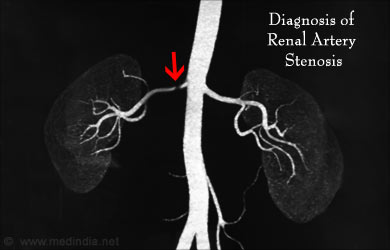
Treatment for Renal Artery Stenosis
Treatment is aimed at:
- Preventing the RAS from worsening.
- Treating renovascular hypertension (RVH) and
- Clearing the blockages in the renal arteries
Treatment for RAS includes:
- Lifestyle changes – including quitting smoking, reducing alcohol, low-fat diet and adequate exercise.
- Medications – is aimed at keeping RVH in check. Patients may be prescribed either an angiotensin-converting enzyme (ACE) inhibitors or angiotensin receptor blockers (ARBs). Diuretics are also helpful in aiding the kidneys remove fluid from the blood. Beta-blockers and calcium-channel blockers and other anti-hypertensive drugs may be required. In some cases, a cholesterol lowering medication and blood thinners may be required.
- Surgery – is usually recommended for patients with RAS who do not improve with medications. Surgery options include angioplasty and stenting where a catheter is inserted into the renal artery and a mesh tube (stent) is placed to keep the plaque flattened and the artery open. Another surgical method is known as bypass surgery where a bypass is created with a vein or synthetic tube to connect the kidney to the aorta. This creates an alternate route for blood flow around the blocked artery into the kidney. An endarterectomy is a method where the plaque is cleaned from the artery thereby clearing it for smooth blood flow.
Treatment options and plans are usually decided on a case-to-case basis by the treating physician, nephrologist and surgeon.
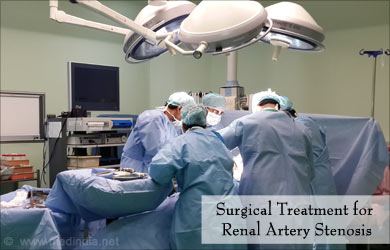
Risk Factors for Renal Artery Stenosis
Understanding the risks and taking precautions is the best way to prevent complications from RAS. Some of the risk factors include:
- Age – over 50 years
- Diabetes
- High blood pressure
- Cholesterol
- Smoking
- Alcohol
- Family history of coronary heart disease or peripheral arterial disease
- Family history of RAS
Preventive Measures for Renal Artery Stenosis
Limiting fats, cholesterol-rich foods, sodium and sugar can help prevent atherosclerosis. People with RAS who have a decline in kidney function must avoid protein-rich foods and go on a diet that is low in sodium, cholesterol and potassium.

